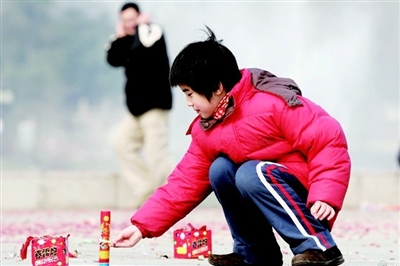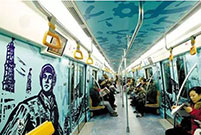

 |
| (File Photo) |
Zhang Lin from northeast China's Jilin province heard less firecrackers during Spring Festival of the past two years.
"The holiday is becoming less festive, but I can accept it if the air quality improves," he told Xinhua.
In the past, Changchun, capital of Jilin, was frequently shrouded by smog. The city announced a regulation in August 2014 to ban fireworks within the fourth ring road, or the city center.
In 2015, density of PM 2.5 there during the Spring Festival dropped by 20.69 percent compared with the year before.
Changchun is not alone.
According to figures released by the Ministry of Public Security last year, a total of 138 cities banned fireworks, while another 536 put limits to time and place fireworks can be used.
The numbers are growing in 2016, as Shanghai implemented a strict fireworks ban on Jan. 1.
A survey by the Shanghai municipal bureau showed that 89.4 percent of the citizens polled supported the ban, but many feel the tradition should be preserved.
"It is such a pity! Our tradition that had survived thousands of years was suddenly abolished," said a web user nicknamed LaonaV on microblog Sina Weibo.
Zhang Lin in Changchun believes governments need to find a way to reduce pollution of fireworks while preserving the tradition.
"I suggest that our governments put on public firework shows, as some foreign countries do," he said.
Wu Zhengli, secretary-general of the China Fireworks and Firecrackers Association, said that efforts should be made to improve the fireworks to make them less polluting. "At the same time, we should crack down on illegal fireworks producers," he said.
In Changchun, to create a festive atmosphere, the city government decorated main roads with red lanterns, set up special markets to sell New Year goods and distributed red scrolls with rhyming phrases, which Chinese people traditionally pasted on their doors for good luck.
Yang Tao, a citizen in Shenyang, capital of the neighboring Liaoning province, told Xinhua that traditions change all the time.
"People are busy sending and receiving electronic 'lucky money' nowadays," he said.
Giving "lucky money" in electronic form is a trendy spin on the Chinese tradition of giving red envelopes of money to children on New Year's Eve. Over 100 million people sent gifts of money via mobile apps last year, according to Alipay, the payment system run by Alibaba.
"In comparison, fireworks are in fact losing shine," he said.
 Have you ever taken these beautiful subways in China?
Have you ever taken these beautiful subways in China? Chinese beauties, foreign models meet in Chengdu
Chinese beauties, foreign models meet in Chengdu Awesome! Aerial pictures taken on J-11 fighter
Awesome! Aerial pictures taken on J-11 fighter A foreign girl explains what China should be proud of
A foreign girl explains what China should be proud of Chinese navy's air-cushioned landing craft in pictures
Chinese navy's air-cushioned landing craft in pictures Chinese pole dancing master opens class in Tianjin
Chinese pole dancing master opens class in Tianjin Splendid Sichuan after snow
Splendid Sichuan after snow College girl of Vancouver crowned Miss Chinese Int'l 2016
College girl of Vancouver crowned Miss Chinese Int'l 2016 Pentagonal Mart becomes the largest vacant building in Shanghai
Pentagonal Mart becomes the largest vacant building in Shanghai Top 20 hottest women in the world in 2014
Top 20 hottest women in the world in 2014 Top 10 hardest languages to learn
Top 10 hardest languages to learn 10 Chinese female stars with most beautiful faces
10 Chinese female stars with most beautiful faces China’s Top 10 Unique Bridges, Highways and Roads
China’s Top 10 Unique Bridges, Highways and Roads After spate of espionage allegations, US law firm opens first China office
After spate of espionage allegations, US law firm opens first China office Author Feng Tang attacks decision to pull book from shelves
Author Feng Tang attacks decision to pull book from shelves Going ape for New Year
Going ape for New Year Black lungs
Black lungsDay|Week